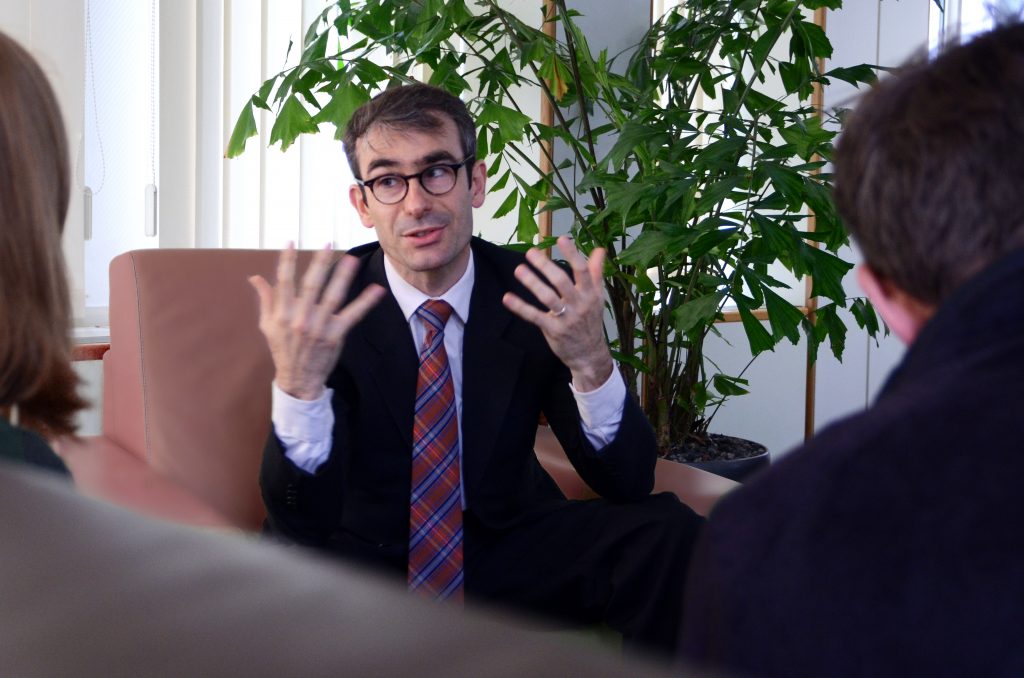Picture: Johan François © European Commission EACEA.
Interview to Gilles Pelayo, Head of Unit of the programme Europe for Citizens, Education, Audiovisual and Culture Executive Agency (EACEA)
What is the specific role of the Education, Audiovisual and Culture Executive Agency?
The European Commission delegates the management of some EU programmes to Executives Agencies (there are 6 of them, all in Brussels). The Education, Audiovisual and Culture Executive Agency (EACEA) is responsible for the management of certain parts of the EU’s funding programmes in the fields of education, culture, audiovisual, sport, citizenship, and volunteering, including the Europe for Citizens programme.
Within this structure, what are the main aims of the Europe for Citizens programme?
Under the overall aim of bringing the Union closer to citizens, the two general objectives of the Programme are: first, to contribute to citizens’ understanding of the Union, its history and diversity; second, to foster European citizenship and to improve conditions for civic and democratic participation at Union level.
In regard to the current socio-political situation (the immigration crisis, the rise of the extreme-right political parties, etc.) can remembrance policies help strengthen the values of freedom, democracy, and human rights? How?
Indeed our hope is that thanks to the remembrance projects we support with the programme, more EU citizens understand not only the process of European unification since the end of WWII but more broadly Europe’s contemporary history and how it has shaped who we are. It has shaped each of us as individuals given that most European families have been directly impacted by the often tragic events of the last century. And also as citizens because this history explains the price we had to pay to enjoy our current democratic and civil rights. Putting some of the issues that are on top of the EU political and policy agenda in this wider historical perspective —understanding where we come from collectively— can only help to strengthen the values of freedom, democracy, and human rights.
This year the European Commission is discussing the evolution of the programme after 2020; will the new programme increase its resources for remembrance projects?
The Commission has proposed on 30 May a new ‘Justice, Rights and Values Fund’ for the period 2021-2027. The proposed new programme groups together two current funding programmes, the Rights, Equality and Citizenship programme and the Europe for Citizens programme, in order to bring simplification, mutual reinforcement, and increased effectiveness.
The general objective of this new programme is to protect and promote the rights and values enshrined in the EU Treaties and the EU Charter of Fundamental Rights. This general objective would be achieved through three specific objectives:
- promoting equality and rights (‘Equality and rights’ strand);
- fighting against all forms of violence (‘Daphne’ strand); and
- promoting citizen engagement and participation in the life of the Union (‘Citizens’ engagement and participation strand’): focus on increasing citizens’ understanding of the Union, its history, cultural heritage and diversity, and promoting exchange and cooperation between citizens of different countries.
The Commission proposes to allocate € 233 million to the ‘Citizens engagement and participation strand’ (compared with the € 185 million over 2014-2020 for the Europe for Citizens programme). Remembrance projects will be funded under this strand. 409 million € should be allocated to the Equality and rights strand and the Daphne strand.
Will the new programme broad the timeframe for memorial projects giving way to initiatives devoted to other chronologies, such as the colonial legacies for instance?
Like for the current programme, the Commission proposal doesn’t go at this level of detail. It only explains that the Fund should increase ‘citizens’ understanding of the Union, its history, cultural heritage and diversity.‘ More detailed priorities are then decided in subsequent work programmes adopted by the Commission.
Some voices say that the Europe for Citizens programme -currently under the Directorate-General for Migration and Home Affairs– can shift to another DG. In that case, could the programme priorities substantially change?
Let’s not mix issues here. What matters ultimately are the programme priorities as proposed by the Commission and eventually co-decided by the two branches of the EU legislative authority i.e. the European Parliament and Council. Under the proposed Rights and Values, citizens’ engagement and participation is clearly presented as a specific objective of the programme and should focus on increasing citizens’ understanding of the Union, its history, cultural heritage and diversity. Then, how the Commission organises its services to manage the said programme comes second —and I would even say is secondary to the extent that the legitimate political institutions will have defined the programme priorities and its budget.
To what extent the Europe for Citizens program promotes social participation through the projects supported by the Agency?
Social participation, citizens’ engagement is really at the core of the programme. It is not a ‘top-down’ institutional communication programme: on the contrary, it supports ‘bottom-up’ grassroots initiatives and projects. This is true for all our actions, and in particular for the remembrance strand: the programme was not conceived to support academic research on the European History —however important this is. It aims at engaging a large number of European citizens on this history, making them discuss, challenge, and ‘own’ their history.
